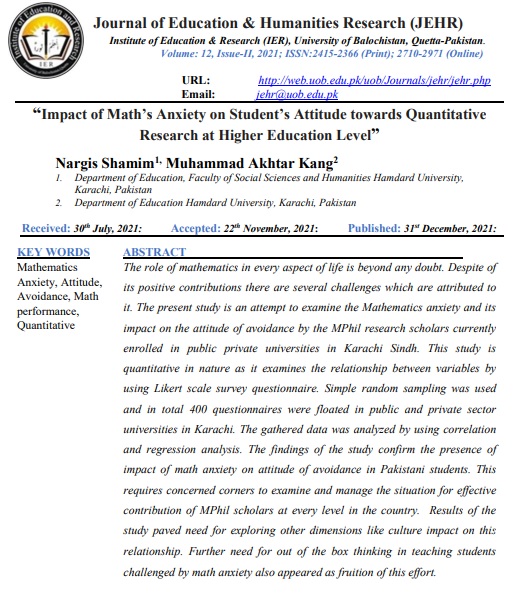Impact of math's anxiety on Student's attitude towards Quantitative Research at Higher Education Level
Keywords:
Mathematics Anxiety, Attitude, Avoidance, Math performance, QuantitativeAbstract
The role of mathematics in every aspect of life is beyond any doubt. Despite of its positive contributions there are several challenges which are attributed to it. The present study is an attempt to examine the Mathematics anxiety and its impact on the attitude of avoidance by the MPhil research scholars currently enrolled in public private universities in Karachi Sindh. This study is quantitative in nature as it examines the relationship between variables by using Likert scale survey questionnaire. Simple random sampling was used and in total 400 questionnaire were floated in public and private sector universities in Karachi. The gathered data was analyzed by using correlation and regression analysis. The findings of the study confirms the presence of impact of math anxiety on attitude of avoidance in Pakistani students. This requires concerned corners to examine and manage the situation for effective contribution of MPhil scholars at every level in the country. Results of the study paved need for exploring other dimensions like culture impact on this relationship. Further need for out of the box thinking in teaching students challenged by math anxiety also appeared as fruition of this effort.
Key Words: Mathematics Anxiety, Attitude, Avoidance, Math performance, Quantitative
References
Aarnos, E., & Perkkilä, P. (2012). Early signs of mathematics anxiety ? 46(2003), 1495–1499. https://doi.org/10.1016/j.sbspro.2012.05.328
Allen, David, S. (2001). Mathematics experience: contributing factors to the math anxiety and avoidance behaviors of female elementary school pre-service teachers. Texas Tech University.
Ashcraft, M. H., & Moore, A. M. (2009). Mathematics Anxiety and the Affective Drop in Performance. 197– 205.
Buckley, S. (2013). Deconstructing maths anxiety : Helping students to develop a positive attitude towards
learning maths. (July).
Carey, E., Hill, F., Devine, A., & Szücs, D. (2016). The Chicken or the Egg ? The Direction of the Relationship Between Mathematics Anxiety and Mathematics Performance. 6(January), 1–6. https://doi.org/10.3389/fpsyg.2015.01987
Chang, H., & Beilock, S. L. (2016). The math anxiety-math performance link and its relation to individual and environmental factors: A review of current behavioral and psychophysiological research. Current Opinion in Behavioral Sciences, 10, 33–38.
Choe, K. W., Jenifer, J. B., Rozek, C. S., Berman, M. G., & Beilock, S. L. (2019). Calculated avoidance : Math
anxiety predicts math avoidance in effort-based decision-making. 1–10.
Cumhur, M., Faculty, S., Tezer, M., & Faculty, S. (2019). Cypriot Journal of Educational dimensional study in the 21st century. 14(2), 222–231.
Dowker, A., Sarkar, A., & Looi, C. Y. (2016). Mathematics Anxiety : What Have We Learned in 60 Years ?
(April). https://doi.org/10.3389/fpsyg.2016.00508
Eden, C., Heine, A., & Jacobs, A. M. (2013). Mathematics Anxiety and Its Development in the Course of Formal Schooling — A Review. Scientific Research, 4(6), 27–35.
Foley, A. E., Herts, J. B., Borgonovi, F., Guerriero, S., Levine, S. C., & Beilock, S. L. (2017). The Math Anxiety-
Performance Link : A Global Phenomenon. https://doi.org/10.1177/0963721416672463
Heilman, R. M. (2015). Neural correlates of math anxiety – an overview and implications. 6(September). https://doi.org/10.3389/fpsyg.2015.01333
Hembree, R. A. Y., & College, A. (2015). THE NATURE , EFFECTS , AND RELIEF OF ANXIETY MATHEMATICS.
(1), 33–46.
Jolejole-caube, C., & Abocejo, F. T. (2019). European Journal of Education Studies ANXIETY TOWARDS MATHEMATICS AND MATHEMATICS PERFORMANCE OF GRADE 7 LEARNERS. 344–360.
https://doi.org/10.5281/zenodo.2694050
Kose, S., Yılmaz, S. K. & Goktas, S. (2018). The relationship between exam anxiety levels and sleep quality of senior high school students. Journal of Psychiatric Nursing, 9(2), 105–111. doi:10.14744/phd.2018.05025
Krantz, Steven, G. (2006). An Episodic History of.
Livio, M. (2009). Is God a mathematician? New York: Simon & Schuster; Illustrated edition.
Namkung, J. M. (2019). The Relation Between Mathematics Anxiety and Mathematics Performance Among School-Aged Students : A Meta-Analysis. https://doi.org/10.3102/0034654319843494
Peker, M. & Ulu, M. (2018). The effect of pre-service mathematics teachers’ beliefs about mathematics teaching anxiety. International Journal of Instruction, 11(3), 249–264. doi:10.12973/iji.2018.1138a
Pietrocola, M. (2010) Mathematics strucutural language of physics thought. In: M. Vicentini & E. Sassi (Eds.), Connecting research in physics education with teacher education (2 edn., Vol. 2, pp 35–48). New Delhi: Angus & Grapher Publishers.
Punaro, L., and Reeve, R. (2012). Relationships between 9-year-olds’ math and literacy worries and
academic abilities. Child Dev. Res. 2012:359089. doi: 10.1155/2012/359089
Ramirez, G., Shaw, S. T., Maloney, E. A., Ramirez, G., Shaw, S. T., Maloney, E. A., … Maloney, E. A. (2018). Math Anxiety : Past Research , Promising Interventions , and a New Interpretation Framework Math Anxiety : Past Research , Promising Interventions , and a New Interpretation Framework. 1520. https://doi.org/10.1080/00461520.2018.1447384
Royse, D., & Rompf, E. L. (2017). Math Anxiety. 7797(April).
Rozgonjuk, D., Kraav, T., Mikkor, K., Orav-puurand, K., & Täht, K. (2020). Mathematics anxiety among STEM and social sciences students : the roles of mathematics self-efficacy , and deep and surface approach to learning. International Journal of STEM Education Https://Doi.Org/10.1186/S40594-020-00246-Z, 7(46), 11.
Secret, M., Ford, J., & Rompf, E. L. (2014). Journal of Social Work Education Undergraduate Research Courses. Journal of Social Work Education, 39(3), 37–41. https://doi.org/10.1080/10437797.2003.10779146
Shabbir, M., Jabeen, S., & Masood, S. (2020). An Exploration of Reasons and Relationships between Female
Teachers ’ Anxiety towards Teaching Mathematics and Students ’ Achievement. 4(2), 670–679.
Sokolowski, H. M., and Necka, E. A. (2016). Remediating math anxiety through cognitive training: potential roles for math ability and social context. J. Neurosci. 36, 1439–1441. doi: 10.1523/JNEUROSCI.4039- 15.2016
Stoehr, K. J. (2017). Mathematics Anxiety : One Size Does Not Fit All. https://doi.org/10.1177/0022487116676316
Wu, S. S., & Menon, V. (2012). Math anxiety in second and third graders and its relation to mathematics achievement. 3(June), 1–11. https://doi.org/10.3389/fpsyg.2012.00162




